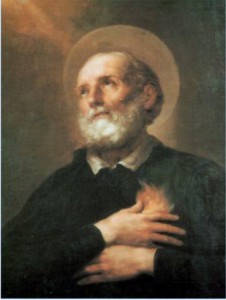The Heart of St Philip’s Apostolate is Beating Strong Half a Millennium after his Birth
 Five hundred years ago today, on July 21 1515, St Philip Neri, the founder of the Oratorians was born in Florence. It is an anniversary that is dear to my heart, because a key reason I moved to London was to be near the London Oratory and be in a position to assist at Mass there. When the London Oratory was first opened in 1884, the Brompton Road location was thought to be removed from the centre of town, an idea that surely makes St Philip chuckle in Heaven today!
Five hundred years ago today, on July 21 1515, St Philip Neri, the founder of the Oratorians was born in Florence. It is an anniversary that is dear to my heart, because a key reason I moved to London was to be near the London Oratory and be in a position to assist at Mass there. When the London Oratory was first opened in 1884, the Brompton Road location was thought to be removed from the centre of town, an idea that surely makes St Philip chuckle in Heaven today!
St Philip spent 60 years in the Eternal City, and is known as the Apostle of Rome. He would spend whole nights in deep prayer in the Catacombs and during the day he would visit the sick in hospital. St Philip is often called the founder of a religious order, but this is not true, because The Oratorians are not a religious order at all. They are a group of secular priests living in a community under a rule. But each Oratorian does not lead the life of a secular priest – they are not moved from church to church by their bishop. A man who feels called to be an Oratorian enters a particular Oratory with the intention of remaining there all his life. But each priest is not bound to the Congregation of the Oratory by a vow or promise, and is free at any time to leave and join a religious order. What is the bond that binds them? They are united by a bond of love, which is fitting because their founder is the patron saint of joy. Every house of the Oratory governs itself and is independent of the others.
The very beginning of the Congregation of the Oratory was in around 1552 when St Philip would gather groups of young laymen for prayer, discussion and reading. Over time, these meetings were moved from St Philip’s private quarters to “an oratory” (which simply means a place of prayer). In the first instance, they found a place in the church of San Girolamo. The Congregation grew from these very prayer meetings, and one of St Philip’s favourite expressions was, “give me ten truly detached men and I do not despair of converting the world with them.”
For modern Catholics, the Oratory signifies loyalty to Rome, while having remarkably reverent liturgies. Nowadays attending the Oratory (perhaps in the Oxford Oratory or in the Brompton Oratory) has become synonymous with a desire to worship in a pre-Vatican II way. But down through the years, I’ve known Catholics of all stripes who love to pray there because there is a time of silence before and after Mass, which allows the brain to become quiet, freeing it from noisy distractions that might divert our attention from raising our hearts and minds to God. The odd time I have seen a celebrity a few pews away, but never have I seen someone interrupt them when they are praying. The Oratory is a selfie-free zone.
The heart of St Philip’s apostolate, bringing people together in prayer in “an oratory”, is still beating strong and is a source of spiritual lifeblood to the many who attend the Oratories all over the world. St Philip was canonised in 1622 on the same day as St Teresa of Avila, St Ignatius and St Isidore. The joke that went round Rome was, “today they canonised three Spaniards and one saint”.
From the Book of Heaven
V10 – 1.17.11 – “Daughter, what you wrote about the Reunions of Priests is nothing but a process that I AM making with them. If they listen to Me – fine. But if they don’t, since the leaders of the ecclesiastics will not listen to Me because they too are bound by the laces of interest, and are slaves of human miseries, almost lapping them up – instead of dominating over those miseries, of interest, of high positions and the like, the miseries dominate them; therefore, since they are deafened by what is human, I will be neither understood nor listened to – I will turn to the civilian leaders, who will listen to Me more easily. Because of their desire to see the priest humiliated, and also because maybe these are a little more stripped than the ecclesiastics themselves, My Voice will be more listened to; and what they do not want to do out of love, I will make them do by necessity and by force, and I will make the government take away what is left to them.”
And I: ‘My Highest and only Good, what will be the name to be given to these Houses, and what the Rules?’
And He: “The name will be: The Houses of the Resurrection of the Faith. As for the Rules, they can use the same Rules as the Oratory of Saint Philip Neri.”
click here for more on St. Philip Neri



















